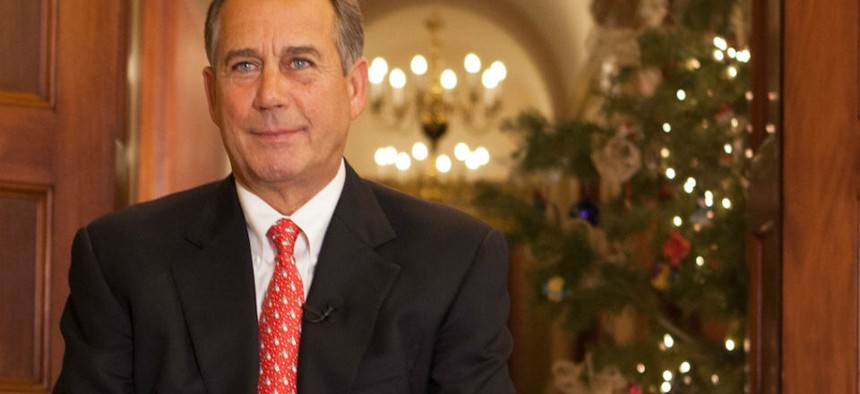
Flickr user Mike Lurie/Speaker John Boehner
John Boehner Forges Ahead on the House Benghazi Probe
How did the speaker respond to a GOP-led report that supported the Obama administration? He reappointed his own select inquiry into the 2012 terrorist attacks.
When the Republican-led House Intelligence Committee released, via a classic Friday evening news dump, the declassified final report of its bipartisan inquiry into the 2012 Benghazi terrorist attack, Speaker John Boehner's office was silent.
The findings were surprising only for how much they appeared to vindicate the Obama administration on several hotly-debated questions about the before, during, and aftermath of September 11, 2012, when four Americans, including Ambassador Christopher Stevens, were killed at U.S. facilities in Libya. There was no intelligence failure prior to the attacks, the committee concluded, nor was there an order for U.S. forces to "stand down" or a denial of air support for the consulate. "Based on the testimony and the documents we reviewed, we concluded that all the CIA officers in Benghazi were heroes," Mike Rogers, the GOP chairman of the panel, and C.A. "Dutch" Ruppersberger, the top Democrat, said in a joint statement accompanying the report. "Their actions saved lives."
Just about the only immediate response to the 37-page report came from Democrats, who proclaimed the conclusions to be a definitive debunking of the many "conspiracy theories" that Republicans have offered in the two years since the attack. Well, Boehner finally did respond to the Intelligence Committee report, four days later, on Tuesday afternoon. He did so not with a statement commending the panel or accepting its findings, but with an announcement that he was reappointing Chairman Trey Gowdy and the other Republican members of the House Select Committee on Benghazi that he formed that year:
"Two years later, the American people still have far too many questions about what happened that night—and why. That’s why I will reappoint Rep. Trey Gowdy and the Republican members of the House Select Committee to investigate the events in Benghazi in the 114th Congress. I look forward to the definitive report Chairman Gowdy and the Select Committee will present to the American people.”
Gowdy's select committee held just one public hearing in the six months since the House voted to form the panel in May, and Boehner has long said that he expected the committee's work to last beyond the 113th Congress, which ends in January. The House will actually have to re-vote to create the panel anew, since it is not a permanent part of the chamber's structure. Yet the timing of Boehner's announcement was as telling as anything, serving notice that whatever the conclusions of the Intelligence Committee, the House is nowhere close to finished with the story.
Rogers, the GOP intelligence chairman, is leaving Congress to become a radio host, while Gowdy is seen as a conservative straight-shooter with a bright future in the House. Jamal Ware, a spokesman for Gowdy's inquiry, said the select committee received the classified version of the intelligence report "months ago" and that it would incorporate it in its own "final, definitive accounting" of the Benghazi attack. A harsh critic of the Obama administration's handling of Benghazi, Senator Lindsey Graham, was far less charitable: "I think the report is full of crap," he said Sunday on CNN's State of the Union. Graham went on to say it was "a bunch of garbage" to conclude that no one in the Obama administration lied about what happened in Libya.
Confronted with the criticism from Graham and other Republicans, Rogers spokeswoman Susan Phalen pointed out that his report exonerates only the intelligence community, not the entire administration. "Many unanswered questions remain about the State Department and White House actions," Phalen said. "Everyone should read the report before jumping to conclusions."
(Flickr user Mike Lurie / Speaker John Boehner)






